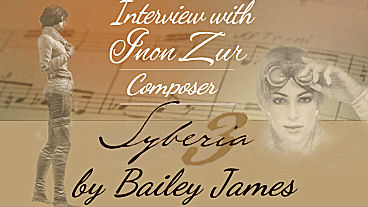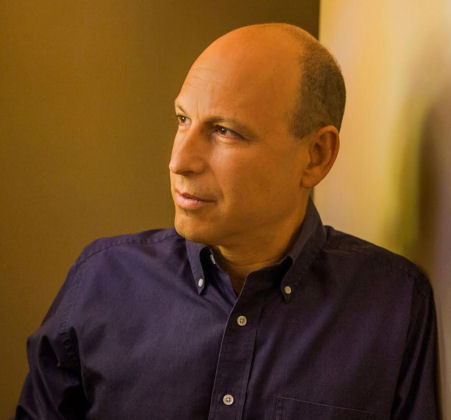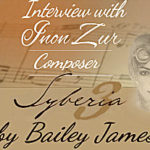
Interview with Composer Inon Zur
Meet the man behind the gorgeous music of Syberia 2 & 3
What makes a game feel real? What makes its world immersive and rich, with a life of its own? Though we often find ourselves talking about our favorite characters or story twists, sound is the element that can take a game from fun to unforgettable and make an experience transportive.
Inon Zur is one of the people who creates that magic. He is a longtime composer who has created prolifically for games such as Dragon Age: Origins, Fallout 4 and, most recently, Syberia 3. His compositions are doused in feeling and help to make the world of the story feel immediate and inviting. He was kind enough to allow us to ask him some questions about his process and his work. You can listen to the Syberia 3 main theme here, watch a video of Zur directing the GamesCom orchestra playing the music of Syberia here, and check out more of Zur’s music here.
JustAdventure: Thanks so much for taking the time to talk to me about your gorgeous scores. To start, I wanted to say how much I love the main theme of Syberia 3. It’s thrilling and expansive and captures the feeling of a grand adventure lying ahead. When creating the music for Syberia, how did you conceptualize what you wanted the sound of it to be? What is the starting point of a new composition or project for you?
Inon Zur: Beginning the composing process for any project is not easy, let alone Syberia, which has so much depth and such a strong narrative. I have to immerse myself into the story and the world I’m composing for, look at the drawings by the artists and almost imagine myself living in that world so I can really capture the right feel with my music.
When I feel the right emotions are in place I start to think about the sound palette and music world, and how we can bring them to life. This is a period of experimentation where I play with lots of ideas and let them sit with me for a while. Soon enough, one idea surfaces that gives me the “it” feeling, and then I grab it! It can be a melodic idea, the sound of a specific instrument or a series of chords. But usually I know when it hits the right spot. Then comes the development of the score.
JA: At what point of the process do you get brought into a video game project? Do you get to see the visual language of a game before creating the music or do you only have the concept?
IZ: This can vary. In some cases I’m brought in really early in the development stage. This is the preferable method for me, since I can “grow and develop” the music alongside the game. This also allows a mutual influence between the creative team and myself. Sometimes I will write music for a scene or level that is not developed yet, and the artists will draw their ideas listening to my music for inspiration. Sometimes the artists will upload some of their own ideas and I write the music as an inspiration of their art. I think it creates a strong cohesion between the music, the art and the story, and ultimately makes the game tighter and stronger.
However, in other cases, I’m brought in late during the process, when most of the game is already done. Although it is not ideal in my opinion, the advantage here is that I get to see the game in its entirety without the need to imagine too much.
JA: Do you dictate the use of different types of sounds or instruments based on the atmosphere of the game? How do you distinguish the sound of a game such as Syberia 3 from one such as Fallout 4?
IZ: I really like to come up with a strong musical signature for each game I’m working on. This is the result of working together with the development team and based on their comments and ideas I can develop a musical style that will be identified with this brand.
For example, in Syberia 3, I used many Eastern European folk instruments as the lead melodic carrier that plays over a classical orchestra. The combination of these instruments with the traditional orchestral soundscape created this “Syberian” musical signature. The melodies in Syberia 3 are also influenced by the Eastern European musical modes, which also contributed to the musical signature in Syberia.

JA: This is your second time composing for a Syberia game as you also provided the score for Syberia 2. How did your previous work on the series inform your compositions for this game? How do you view the relationship between the two scores?
IZ: I consider the score for Syberia 3 to be an evolution of the music which builds upon the Syberia 2 soundtrack. In many cases I use the same instruments in both scores, but in Syberia 3 I introduced many new elements and musical styles.
Obviously, the score is derived from the storyline, art style and locations in the game, and my music follows quite closely the unfolding of this new adventure.
The level of maturity has evolved as well, just as the characters in the game have developed and gotten more sophisticated and intricate. The music reflects these changes and supports the new storyline by embodying the emotions derived from it.
JA: What are the challenges of scoring video games over movies or other media? Which medium do you most enjoy composing for?
IZ: In movies and TV the music has to stay locked to the given picture most of the time, and to describe it very closely. This can create limitations if you want to compose a piece with a natural musical development and arc. In games, since you are not always locked to a picture, we are able to write a more “free style” composition — which allows us to further develop the idea without the limitations of a specific picture or structure. As far as personal enjoyment goes — both media present different sets of challenges, and it is fun to tackle these in both cases.
JA: Do you play the games that feature your music?
IZ: Sometimes I will be able to play the game before it is published so I can see what is needed to maximize the potential of the music. In other cases I will play the game after it has been published to experience the finished product. I also try to play games that I did not write the music for; this way I learn from other experiences. I think it’s important to keep learning and pushing your own music forward in new ways.
JA: What’s the best music you’ve ever heard in a video game?
IZ: That’s a tough one. I’ve enjoyed Greg Edmonson’s scores for Uncharted and Jesper Kyd’s music for Assassin’s Creed.
Thanks so much to Inon Zur for giving us an insight into his process. Again, you can listen to the Syberia 3 main theme here, watch a video of Zur directing the GamesCom orchestra playing the music of Syberia here, and check out more of Zur’s music here.

Leave a Reply